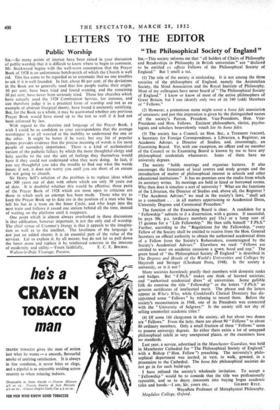LETTERS TO THE EDITOR
Public Worship
SIR,—So many points of interest have been raised in your discussion of public worship that it is difficult to know where to begin to comment. Mr. Stockwood begins with the well-worn assumption that the Prayer Book of 1928 is an unfortunate hotch-potch of which the Church is well rid. This has come to be regarded as so axiomatic that no one troubles to ask if it is well founded. In fact, about 80 per cent, of the deviations in the Book are so generally used that few people realise their origin; 10 per cent. have been tried and found wanting, and the remaining 10 per cent, have never been seriously tried. Those few churches which have actually used the 1928 Communion Service, for instance, and can therefore judge it as a practical form of worship and not as an example of abstract liturgical theory, have found it eminently satisfying. But, for the Book as a whole, it may be questioned whether any previous Prayer Book would have stood up to the test so well if it had not been enforced by law.
With regard to the doctrine and language of the Prayer Book, I wish I could be as confident as your correspondents that the average worshipper is at all worried at his inability to understand the one or the other. It might be better if he were; but any list of popular hymns provides evidence that the precise meaning of words is for most people of secondary importance. There is a kind of ecclesiastical variant of the pathetic fallacy by which the more thoughtful clergy and laity ascribe to the rest the sort of feelings they themselves would have if they could not understand what they were doing. In fact, if you are thoughtful you take the trouble to find out what the words mean; if not, it does not worry you until you are short of an excuse for not going to church.
Sir Henry Self's solution of the problem is to replace ideas which are 300 years out of date with others which are only 30 years out of date. It is doubtful whether this would be effective; those parts of the Prayer Book of 1928 which are most open to criticism are those in which such an attempt has been made. Those who try to keep the Prayer Book up to date are in the position of a man who has left his hat in a tram on the Inner Circle, and who leaps into the next train and follows it round one station behind all the time, instead of waiting on the platform until it reappears.
One point which is almost always overlooked in these discussions is that edification, however important, is not the only end of worship. The chief virtue of Cranmer's liturgy is that it appeals to the imagina- tion as well as to the intellect. The loveliness of the language is not just an added charm; it is an essential part of the value of the services. Let us explain it, by all means; but do not let us pull down the hewn stone and replace it by reinforced concrete in the interests


































 Previous page
Previous page